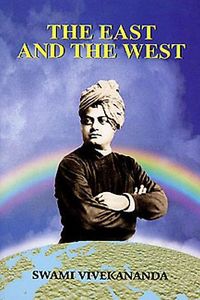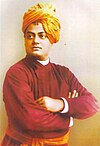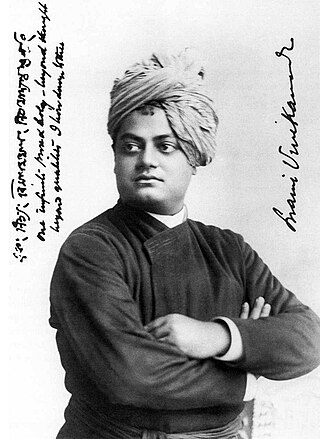
Swami Vivekananda, born Narendranath Datta, was an Indian Hindu monk, philosopher, author, religious teacher, and the chief disciple of the Indian mystic Ramakrishna. He was a key figure in the introduction of Vedanta and Yoga to the Western world, and the Father of modern Indian nationalism who is credited with raising interfaith awareness and bringing Hinduism to the status of a major world religion.

Shuddhananda who was the fifth president of the Ramakrishna Order, was a direct monastic disciple of Vivekananda. He joined the Ramakrishna Math in 1897. He became a trustee of Ramakrishna Math and a member of the governing body of Ramakrishna Mission in May 1903. He also took up the editorship of the Bengali magazine called Udbodhan for sometime. He was appointed as the secretary of the math and the mission in 1927 and as the vice president in 1937. In 1938, he became the president of the order. His tenure was short, as he died in 1938. He is renowned in the literary circles to have translated most of Vivekananda's original works from English to Bengali.

Swami Virajananda, born Kalikrishna Bose, was an initiated disciple of Sarada Devi and the sixth president of the Ramakrishna Order. Born as the son of Trailokyanath Bose and Nishadkalidevi, Virajananda was the first person to join the Ramakrishna Order after the direct disciples of Ramakrishna. In 1897, he was initiated into sannyasa by Vivekananda. From 1899 onward he served in Advaita Ashrama, Mayavati and became its president in 1906. He is recognised as a monastic disciple of Vivekananda.

Sister Nivedita was an Irish teacher, author, social activist, school founder and disciple of Swami Vivekananda. She spent her childhood and early youth in Ireland. She was engaged to marry a Welsh youth, but he died soon after their engagement.
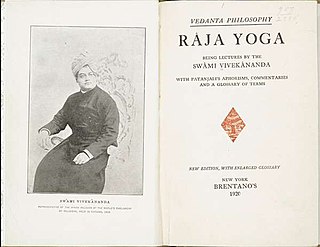
Raja Yoga is a book by Swami Vivekananda about "Raja Yoga", his interpretation of Patanjali's Yoga Sutras adapted for a Western audience. The book was published in July 1896. It became an instant success and was highly influential in the Western understanding of yoga.

Prabuddha Bharata is an English-language monthly journal of the Ramakrishna Order, in publication since July 1896. It carries articles and translations by monks, scholars, and other writers on humanities and social sciences including religious, psychological, historical, and cultural themes. It has a section of book reviews where important publications from university presses from around the world are reviewed. It is edited from Advaita Ashrama, Mayavati, Uttarakhand, and published and printed in Kolkata. Prabuddha Bharata is India's longest running English journal.

Vedanta Societies refer to organizations, groups, or societies formed for the study, practice, and propagation of Vedanta, the culmination of Vedas. More specifically, they "comprise the American arm of the Indian Ramakrishna movement", and refer to branches of the Ramakrishna Order located outside India.

Advaita Ashrama, Mayavati, is a branch of the Ramakrishna Math, founded on 19 March 1899 at the behest of Vivekananda, by his disciples James Henry Sevier, and Charlotte Sevier. Today it publishes the original writings of Vivekananda. As an ashram dedicated to the study and practice of Advaita Vedanta, no images or idols are worshipped there, not even of Ramakrishna; and no images were kept in the premises according to the Ashram ideals set by Vivekananda.

Eknath Ramakrishna Ranade was a social activist and leader. He led the Rashtriya Swayamsevak Sangh.
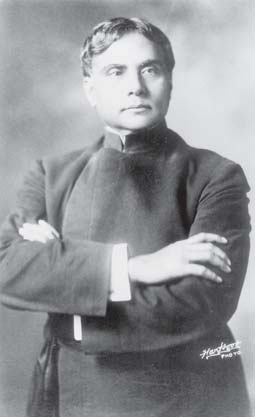
Swami Abhedananda, born Kaliprasad Chandra, was a direct disciple of the 19th century mystic Ramakrishna Paramahansa and the founder of Ramakrishna Vedanta Math. Swami Vivekananda sent him to the West to head the Vedanta Society of New York in 1897, and spread the message of Vedanta, a theme on which he authored several books through his life, and subsequently founded the Ramakrishna Vedanta Math, in Calcutta and Darjeeling.
Swami Vivekananda on Himself is a biographical book on Swami Vivekananda written in an autobiographical manner. This book was published in 1963 by Swami Sambudhdhananda, general secretary of Swami Vivekananda's birth centenary committee. In this book, the life and different incidents of Swami Vivekananda's life have been written here in his own words.

Swami Vivekananda was a Hindu monk from India. His teachings and philosophy are a reinterpretation and synthesis of various strands of Hindu thought, most notably classical yoga and (Advaita) Vedanta, with western esotericism and Universalism. He blended religion with nationalism, and applied this reinterpretation to various aspect's of education, faith, character building as well as social issues pertaining to India. His influence extended also to the west, and he was instrumental in introducing Yoga to the west.

Josephine MacLeod was an American friend and devotee of Swami Vivekananda. She had a strong attachment to India and was an active participant in the Ramakrishna Vivekananda movement. She was given the nicknames "Tantine" and "Jo Jo" by Vivekananda. She considered Swami Vivekananda to be her friend and helped him with his finances. MacLeod was not a sanyasin, unlike many others such as Sister Nivedita or Sister Christine. She was instrumental in spreading Vivekananda's message on Vedanta in the West. She made many contributions to the initial and the later phases of the development of the order of Ramakrishna and Vivekananda. She was a contributor to many causes espoused by Sister Nivedita, the most famous disciple of Vivekananda, including that of contributing financially towards the development of the Indian National Movement especially in Bengal and elsewhere in India.

Swami Vivekananda (1863–1902) was an Indian Hindu monk and a key figure in the introduction of Indian philosophies of Vedanta and Yoga to the western world. He was one of the most influential philosophers and social reformers in his contemporary India and the most successful and influential missionaries of Vedanta to the Western world. Indian Nobel laureate poet Rabindranath Tagore's suggested to study the works of Vivekananda to understand India. He also told, in Vivekananda there was nothing negative, but everything positive.

Vedanta Philosophy: An address before the Graduate Philosophical Society is a lecture given by Swami Vivekananda on 25 March 1896 at the Graduate Philosophical Society of Harvard University. After this lecture, the university offered Vivekananda the chair of Eastern Philosophy.

My Master is an English book combined from two lectures delivered by Swami Vivekananda in New York and England, published in 1901.

Nachuk Tahate Shyama,, is a Bengali language poem written by Vivekananda. The poem was originally published in two issues in Vivekodayam in 1904. The poem was later included in the second volume of The Complete Works of Swami Vivekananda. The long poem relates to one's surrender to the Hindu goddess Shyama or Kali, and is also interpreted as "Let Kali dance there" a poem dedicated to Kali.
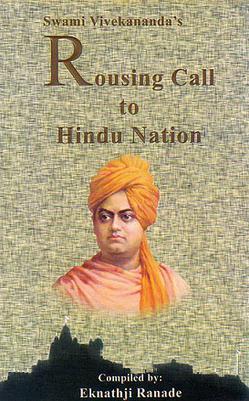
Rousing Call to Hindu Nation or Swami Vivekananda's Rousing Call to Hindu Nation (1963) is a compilation of Indian Hindu monk Swami Vivekananda's writings and speeches edited by Eknath Ranade the leader of Rashtriya Swayamsevak Sangh. The book was published in 1963, in the birth centenary of Vivekananda. Ranade dedicated the book as a "personal homage to the great patriot-saint" Swami Vivekananda.

Sangeet Kalpataru is a Bengali language song anthology edited and compiled by Swami Vivekananda and Vaishnav Charan Basak. The book was first published in August or September 1887 from Arya Pustakalaya, Calcutta. In 2000, the book was reprinted by the Ramakrishna Mission Institute of Culture. It was edited with a critical introduction by Dr. Sarbananda Choudhury.
In 1888, Swami Vivekananda left the monastery as a Parivrâjaka— the Hindu religious life of a wandering monk, "without fixed abode, without ties, independent and strangers wherever they go". His sole possessions were a kamandalu, staff and his two favourite books: the Bhagavad Gita and The Imitation of Christ. Narendra travelled extensively in India for five years, visiting centres of learning and acquainting himself with diverse religious traditions and social patterns. He developed sympathy for the suffering and poverty of the people, and resolved to uplift the nation. Living primarily on bhiksha (alms), Swami Vivekananda travelled on foot and by railway. During his travels he met, and stayed with Indians from all religions and walks of life: scholars, dewans, rajas, Hindus, Muslims, Christians, paraiyars and government officials.
